UK has assisted dying vote scheduled in its parliament as religious leaders and politicians debate

The BBC, Britain's national and international broadcaster said that if lawmakers vote on assisted dying this week, their decision will have "consequences for decades."
However, British commentator Simon Jenkins waded in and wrote in The Guardian newspaper on Nov 25, "it's outrageous that religious faith is being brought into the assisted dying debate."
"Too much of the discussion draws on religion. This cannot be just. Imposing religious doctrine on a largely secular country is archaic," wrote Jenkins.
"A joint letter by 29 faith leaders against the legislation was published last weekend, while the justice secretary, Shabana Mahmood, has said her faith was the 'start point' for her opposition to the issue (though she emphasized in a letter to her constituents that she 'would never impose my religious beliefs on anyone else.').
"For most British people, death is an act not of God but of nature, and an act that we can in some degree regulate," argued Jenkins.
If the Terminally Ill Adults (End of Life) Bill for England and Wales becomes law, it will give people, in certain circumstances, the right to die at a time of their choosing, reported the BBC.
The proposed law would make it legal for over-18s who are terminally ill to be given medical assistance to end their own life in England and Wales.
The Labour Party Member of Parliament proposing the law, Kim Leadbeater, says the safeguards are the "most robust" in the world, but others argue it is a "slippery slope towards death on demand," Sky News reported.
Specific eligibility criteria must be met and if a person meets all this eligibility criteria, a life-ending "approved substance" could be prescribed.
This would be self-administered, so the individual wishing to die must take it themselves.
"This is sometimes called physician-assisted dying and is different from voluntary euthanasia, when a health professional would administer the drugs," said Sky News.
The draft law would make it illegal to pressure or coerce someone to make a declaration that they wish to end their life, or take the medicine.
CATHOLIC CHURCH LEADER
Earlier in the week, the leader of the Catholic Church in England and Wales said he wishes Archbishop of Canterbury Justin Welby was alongside him as the assisted dying debate in Parliament edges closer, a Press Association reports carried in London's Standard newspaper said.
Cardinal Vincent Nichols said he regrets Welby's absence from the conversation after the Church of England leader announced he was quitting over past failures in handling a sexual abuse scandal.
The Anglican leader had warned last month, as the assisted dying Bill was being officially introduced in Parliament, of a "slippery slope" in terms of who would be eligible for such a service if it was legalized.
On Nov. 12, Welby announced he would be standing down after an independent review concluded serial abuser John Smyth might have been brought to justice had the church leader formally reported him to police more than a decade ago.
The archbishop has since been largely absent from public life and from the assisted dying debate, which at the weekend saw different faith leaders sign a letter opposing the Bill.
Dame Sarah Mullally, the Bishop of London and the Church of England lead bishop for health and social care had warned that a right to die could "all too easily" end in vulnerable people feeling they have "a duty to die
The Archbishop of Canterbury and other Christian, Jewish, Muslim and Sikh leaders want politicians to reject proposals to permit doctors to prescribe a lethal dose to terminally-ill patients, Premier Christian News reported.
His predecessor, the former Archbishop of Canterbury, Lord Carey has argued in favor of a change in the law, despite the Church of England's official opposition to it.
Among the faith leaders to sign the joint letter are Shuja Shafi, secretary general of the Muslim Council of Britain, Ephraim Mirvis, chief rabbi of the United Hebrew Congregations of the Commonwealth and Lord Singh of Wimbledon, director of the Network of Sikh Organisations UK.